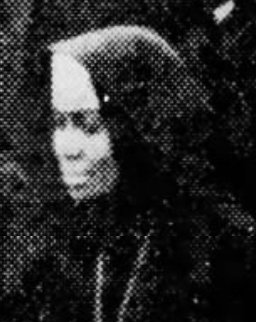Mary Antona Ebo facts for kids
Mary Antona Ebo (born Elizabeth Louise Ebo) was an American nun. She was also a hospital leader and a civil rights activist. She was the first African-American woman to lead a Catholic hospital. She is famous for marching with Martin Luther King Jr. in Selma, Alabama, in 1965. She bravely said, "I'm here because I'm a Negro, a nun, a Catholic, and because I want to bear witness."
Contents
Early Life and Education
Mary Antona Ebo was born in Bloomington, Illinois, on April 10, 1924. Her parents were Daniel and Louise Teal Ebo. From 1930 to 1942, she lived at the McLean County Home for Colored Children. This was after her mother passed away and her father lost his job during the Great Depression. She spent a lot of her childhood in the hospital. Once, she had to have her thumb removed because of an infection. Later, she was treated for tuberculosis.
In 1944, she made history at Holy Trinity High School. She was the first black student to graduate from there. She became a Catholic in 1942. She then trained to be a nurse at St. Mary's (Colored) Infirmary School of Nursing in St. Louis.
As a Catholic nun, she continued her studies. She earned a bachelor's degree in medical record science in 1962. She also earned two master's degrees. One was in hospital leadership in 1970, and the other was in the theology of health care in 1978. Both degrees were from Saint Louis University. From 1979, she also held a special certificate to be a chaplain.
Career and Activism
Medical and Pastoral Work
In 1946, Sister Ebo was one of the first three black women to join the Sisters of St. Mary. She became Sister Mary Antona when she took her final vows in 1954. She worked in medical records at Firmin Desloge Hospital from 1955 to 1961. From 1962 to 1967, she directed medical records at St. Mary's Infirmary.
In 1967, she became the executive director of St. Clare's Hospital in Baraboo, Wisconsin. This made her the first African-American woman to lead a Catholic hospital. In 1974, she became the executive director of the Wisconsin Conference of Catholic Hospitals. She also worked at Catholic hospitals in Madison, Wisconsin, and at the University of Mississippi Medical Center. From 1992 to 2008, she served as a pastoral associate at St. Nicholas Church in St. Louis.
Civil Rights Activism
With support from her mother superior, Sister Ebo and five other nuns joined the Martin Luther King Jr. march in Selma in 1965. They wore their full nun's clothing. Sister Ebo's story was featured in a 2007 documentary called Sisters of Selma: Bearing Witness for Change.
In 1968, Sister Ebo helped start the National Black Sisters' Conference. She was the president of this group from 1980 to 1982. In 1989, she received the Harriet Tubman Award for her service and leadership. She also served on the Human Rights Commission for the Archdiocese of St. Louis. She was a member of the Missouri Catholic Conference on Social Concerns.
In 1999, she received Communion from Pope John Paul II himself. This happened when the Pope visited St. Louis. Rosa Parks was also in the group of people who received Communion. In 2013, she attended a special event to remember the 1965 march. She crossed the Edmund Pettus Bridge with Congressman John Lewis. In 2014, when she was in her nineties, Sister Ebo gave a message at a prayer service in Ferguson. This was after the death of Michael Brown Jr.
Later Life and Legacy
Sister Mary Antona Ebo passed away on November 11, 2017. She was 93 years old. She died at the Sarah Community, a retirement home in Bridgeton, Missouri. She had been a nun for 71 years. A seminar room at the Cardinal Rigali Center in St. Louis is named after her. This honors her important work and contributions.
 | Audre Lorde |
 | John Berry Meachum |
 | Ferdinand Lee Barnett |


